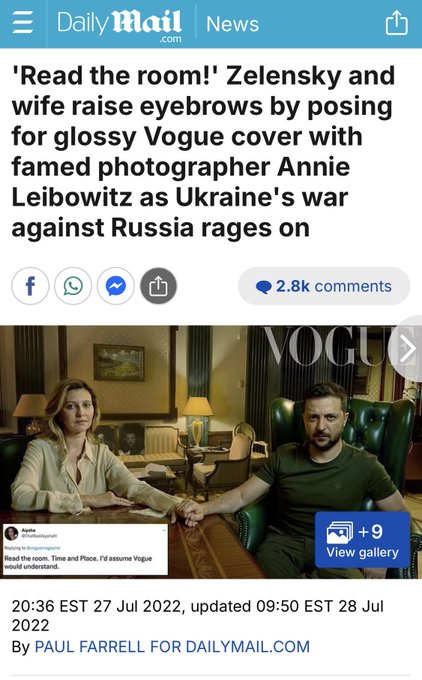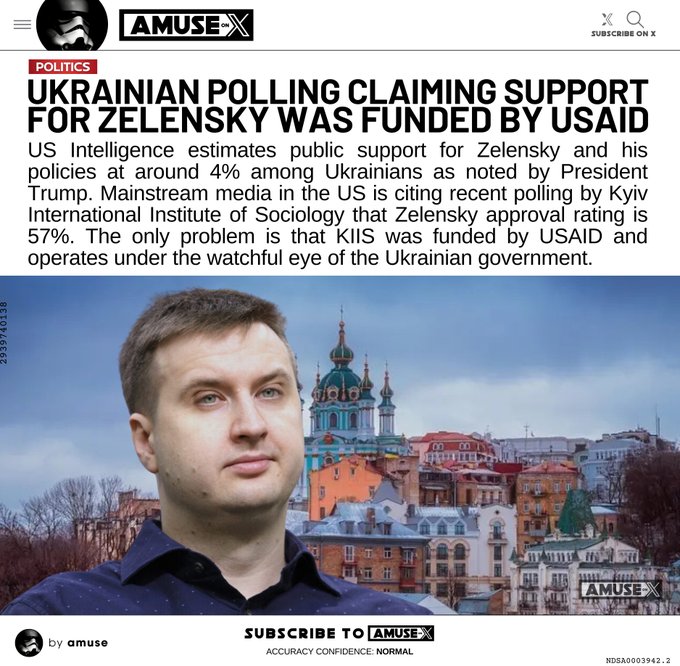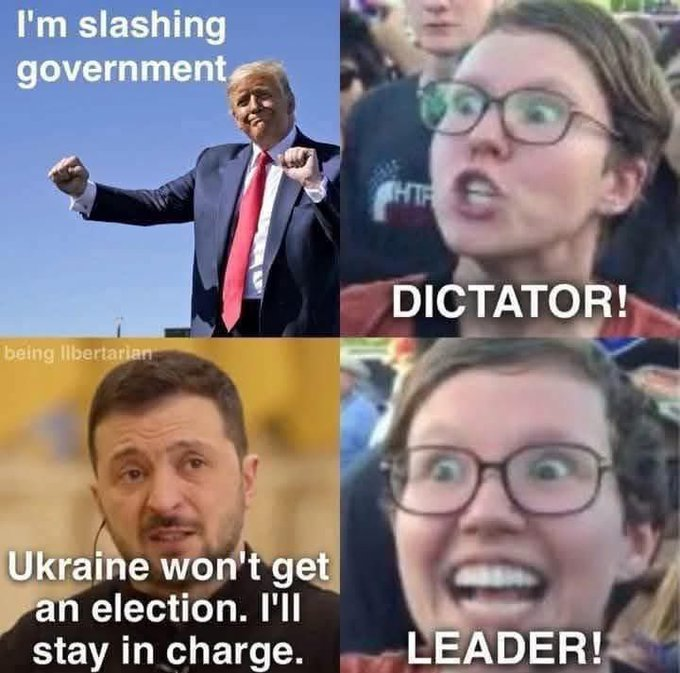You are using an out of date browser. It may not display this or other websites correctly.
You should upgrade or use an alternative browser.
You should upgrade or use an alternative browser.
The great dictator
- Thread starter Diogenes
- Start date
Review of Serhii Plokhy's book on Ukraine, ‘The Russo-Ukrainian War’
Even the title of this book is wrong.
It describes a war between Russia and America, on the soil of Ukraine. Yet it calls it ‘The Russo-Ukrainian War’.
Without the deep, decades-long involvement of the USA, and without its military aid, Ukraine would not be able to fight and Russia would not have invaded Ukraine.
To leave America out of the title is like leaving the Hound out of the Baskervilles.
This is not to say that it is a bad book, or that it is inaccurate. Anything but.
It is just to say that it omits huge and important parts of the story. Professor Plokhy, himself a Ukrainian, is a fine, crisp writer and does brilliant research.
He does not hide the fact that Ukraine is not the perfect law-governed democracy that so many sentimentalists, new to the region, like to pretend.
Evaluating that democracy rather politely as ‘viable but chaotic’ he admits the existence of serious corruption and other wickedness.
He writes (for example) about an inconvenient journalist who annoyed those in power and whose headless body was then found in the woods.
He recounts the fate of the sinister minister of Internal Affairs who committed alleged suicide by somehow shooting himself in the head twice.
These, like the arrest of a Supreme Court judge on charges of corruption are illuminating correctives to the modish view that Ukraine is somehow so well-run that Russians envy its way of life.
Yet in general the book is dominated by the conventional wisdom of ‘West Good, Russia Bad’ which does not actually aid understanding.
To find out more about the rough edges of Ukrainian politics, I would recommend Professor Richard Sakwa’s very different ‘Frontline Ukraine’ as a good companion volume.
To see an alternative view of the origins of the war, Ben Abelow’s ‘How the West Brought War to Ukraine’ is a powerful corrective to fashionable thought.
The Ukraine crisis is only the latest expression of a century-old struggle for mastery in Europe.
Yet you would not know from Professor Plokhy’s book that modern Ukraine’s existence as a state began when the German empire violently tore it from the grasp of the Russian empire in 1918.
Surely this one fact illuminates the whole terrible controversy and indeed the murderous history of the region ever since, and the furious, often cruel passions unleashed there.
And Prof Plokhy’s bland description of the 1940s Ukrainian nationalist leader Stepan Bandera and his Organisation of Ukrainian Nationalists (OUN) does not really explain why so many Ukrainians (and Jews and Poles) loathe his very memory and that of the OUN, whose red and black flags can still be seen in street demonstrations in Ukraine.
Bandera was a fanatic, imprisoned in pre-war Poland for his part in the assassination of a government minister.
He was also a racial bigot, and beyond doubt an anti-Semite, who sought to collaborate with Hitler and whose followers and sympathizers undoubtedly engaged in murders of Jews and Poles.
Nor does it explain why other Ukrainians put up statues to him, thanks to his enduring popularity with the fiercer factions of Ukrainian nationalism, whose continuing prominence is an embarrassment to that country.
But the book does describe the important and connected truth, ignored by so many commentators, that there is more than one kind of Ukrainian.
In fact, until 2014, the very large difference between the two halves of the country - roughly north-west versus roughly south-east - gave Ukraine that priceless advantage, a narrowly balanced electorate.
This permanent tension meant that governments could and did fall – and could be peacefully replaced by democratic votes.
It also meant that there was always a strong opposition. Ukraine was the most competitive, evenly-divided democracy in the lands of the former USSR.
And this was largely thanks to the split between eastern voters who spoke mainly Russian and did not wish to join the EU or Nato, matched against a more nationalistic and more EU-oriented west.
That is why Ukraine escaped Russian-style despotism.
But when the eastern-backed (and fairly-elected) President Viktor Yanukovych was overthrown in an illegal, violent convulsion in February 2014, that all changed.
Large chunks of the country were swiftly grabbed by Russia and its proxies.
What was left of Ukraine was much more united, and much more Ukrainian, as elections since have shown. But is it perhaps also less free?
Gone are the noisy but democratic days of strong oppositions, close elections and narrowly-balanced parliaments.
The key event in all this was the overthrow of Yanukovych, a much-disputed moment.
Prof Plokhy’s description of this process is creditably detailed and researched. And his timeline is inconvenient for those who still pretend that the legitimate President was lawfully removed.
Two serious attempts were made by Yanukovych to reach a peaceful, constitutional deal with the protestors and the opposition.
The first such compromise was actually under way on February 18. But the protesters destroyed it by attacking and torching Yanukovych’s party HQ.
Two days later EU Foreign Ministers brokered a second deal, including early elections. Again the protestors rejected it, some threatening violence.
Was this because they did not think their faction would win those early elections? Who can say?
But Prof Plokhy’s account of Yanukovych’s behavior over the following few days shows beyond doubt that the President was still in Ukraine when Parliament voted illegally to remove him (it lacked the votes needed to do so under the constitution, but went ahead anyway).
Those who condone the removal (including the British government) have tried to justify this lawless act on the grounds that Yanukovych had fled the country.
Now they cannot say this. There is so much more here to inform this huge and important debate that I can only urge anybody who cares about the matter to read the book.
The more we all know about this crisis, the more hope there is of bringing it to a civilized end.
Even the title of this book is wrong.
It describes a war between Russia and America, on the soil of Ukraine. Yet it calls it ‘The Russo-Ukrainian War’.
Without the deep, decades-long involvement of the USA, and without its military aid, Ukraine would not be able to fight and Russia would not have invaded Ukraine.
To leave America out of the title is like leaving the Hound out of the Baskervilles.
This is not to say that it is a bad book, or that it is inaccurate. Anything but.
It is just to say that it omits huge and important parts of the story. Professor Plokhy, himself a Ukrainian, is a fine, crisp writer and does brilliant research.
He does not hide the fact that Ukraine is not the perfect law-governed democracy that so many sentimentalists, new to the region, like to pretend.
Evaluating that democracy rather politely as ‘viable but chaotic’ he admits the existence of serious corruption and other wickedness.
He writes (for example) about an inconvenient journalist who annoyed those in power and whose headless body was then found in the woods.
He recounts the fate of the sinister minister of Internal Affairs who committed alleged suicide by somehow shooting himself in the head twice.
These, like the arrest of a Supreme Court judge on charges of corruption are illuminating correctives to the modish view that Ukraine is somehow so well-run that Russians envy its way of life.
Yet in general the book is dominated by the conventional wisdom of ‘West Good, Russia Bad’ which does not actually aid understanding.
To find out more about the rough edges of Ukrainian politics, I would recommend Professor Richard Sakwa’s very different ‘Frontline Ukraine’ as a good companion volume.
To see an alternative view of the origins of the war, Ben Abelow’s ‘How the West Brought War to Ukraine’ is a powerful corrective to fashionable thought.
The Ukraine crisis is only the latest expression of a century-old struggle for mastery in Europe.
Yet you would not know from Professor Plokhy’s book that modern Ukraine’s existence as a state began when the German empire violently tore it from the grasp of the Russian empire in 1918.
Surely this one fact illuminates the whole terrible controversy and indeed the murderous history of the region ever since, and the furious, often cruel passions unleashed there.
And Prof Plokhy’s bland description of the 1940s Ukrainian nationalist leader Stepan Bandera and his Organisation of Ukrainian Nationalists (OUN) does not really explain why so many Ukrainians (and Jews and Poles) loathe his very memory and that of the OUN, whose red and black flags can still be seen in street demonstrations in Ukraine.
Bandera was a fanatic, imprisoned in pre-war Poland for his part in the assassination of a government minister.
He was also a racial bigot, and beyond doubt an anti-Semite, who sought to collaborate with Hitler and whose followers and sympathizers undoubtedly engaged in murders of Jews and Poles.
Nor does it explain why other Ukrainians put up statues to him, thanks to his enduring popularity with the fiercer factions of Ukrainian nationalism, whose continuing prominence is an embarrassment to that country.
But the book does describe the important and connected truth, ignored by so many commentators, that there is more than one kind of Ukrainian.
In fact, until 2014, the very large difference between the two halves of the country - roughly north-west versus roughly south-east - gave Ukraine that priceless advantage, a narrowly balanced electorate.
This permanent tension meant that governments could and did fall – and could be peacefully replaced by democratic votes.
It also meant that there was always a strong opposition. Ukraine was the most competitive, evenly-divided democracy in the lands of the former USSR.
And this was largely thanks to the split between eastern voters who spoke mainly Russian and did not wish to join the EU or Nato, matched against a more nationalistic and more EU-oriented west.
That is why Ukraine escaped Russian-style despotism.
But when the eastern-backed (and fairly-elected) President Viktor Yanukovych was overthrown in an illegal, violent convulsion in February 2014, that all changed.
Large chunks of the country were swiftly grabbed by Russia and its proxies.
What was left of Ukraine was much more united, and much more Ukrainian, as elections since have shown. But is it perhaps also less free?
Gone are the noisy but democratic days of strong oppositions, close elections and narrowly-balanced parliaments.
The key event in all this was the overthrow of Yanukovych, a much-disputed moment.
Prof Plokhy’s description of this process is creditably detailed and researched. And his timeline is inconvenient for those who still pretend that the legitimate President was lawfully removed.
Two serious attempts were made by Yanukovych to reach a peaceful, constitutional deal with the protestors and the opposition.
The first such compromise was actually under way on February 18. But the protesters destroyed it by attacking and torching Yanukovych’s party HQ.
Two days later EU Foreign Ministers brokered a second deal, including early elections. Again the protestors rejected it, some threatening violence.
Was this because they did not think their faction would win those early elections? Who can say?
But Prof Plokhy’s account of Yanukovych’s behavior over the following few days shows beyond doubt that the President was still in Ukraine when Parliament voted illegally to remove him (it lacked the votes needed to do so under the constitution, but went ahead anyway).
Those who condone the removal (including the British government) have tried to justify this lawless act on the grounds that Yanukovych had fled the country.
Now they cannot say this. There is so much more here to inform this huge and important debate that I can only urge anybody who cares about the matter to read the book.
The more we all know about this crisis, the more hope there is of bringing it to a civilized end.
We are witnessing a very sad moment in American history.
Bernie Sanders, who claims to stand up for working Americans, is a shameless puppet of warmongering oligarchs.
View: https://x.com/GuyNAustin/status/1892630486544961636
Bernie Sanders, who claims to stand up for working Americans, is a shameless puppet of warmongering oligarchs.
View: https://x.com/GuyNAustin/status/1892630486544961636
This is moralistic garbage, which is unfortunately the rhetorical currency of the globalists because they have nothing else to say.
For three years, President Trump and I have made two simple arguments: first, the war wouldn't have started if President Trump was in office; second, that neither Europe, nor the Biden administration, nor the Ukrainians had any pathway to victory.
This was true three years ago, it was true two years ago, it was true last year, and it is true today.
And for three years, the concerns of people who were obviously right were ignored.
What is Niall's actual plan for Ukraine? Another aid package? Is he aware of the reality on the ground, of the numerical advantage of the Russians, of the depleted stock of the Europeans or their even more depleted industrial base?
Instead, he quotes from a book about George HW Bush from a different historical period and a different conflict. That's another currency of these people: reliance on irrelevant history.
President Trump is dealing with reality, which means dealing with facts.
And here are some facts:
Number one, while our Western European allies' security has benefitted greatly from the generosity of the United States, they pursue domestic policies (on migration and censorship) that offend the sensibilities of most Americans and defense policies that assume continued over-reliance.
Number two, Russians have a massive numerical advantage in manpower and weapons in Ukraine, and that advantage will persist regardless of further Western aid packages. Again, the aid is *currently* flowing.
Number three, the United States retains substantial leverage over both parties to the conflict.
Number four, ending the conflict requires talking to the people involved in starting it and maintaining it.
Number five, the conflict has placed--and continues to place--stress on tools of American statecraft, from military stockpiles to sanctions (and so much else). We believe the continued conflict is bad for Russia, bad for Ukraine, and bad for Europe. But most importantly, it is bad for the United States.
Given the above facts, we must pursue peace, and we must pursue it now.
President Trump ran on this, he won on this, and he is right about this.
It is lazy, ahistorical nonsense to attack as "appeasement" every acknowledgment that America's interest must account for the realities of the conflict.
That interest--not moralisms or historical illiteracy--will guide President Trump's policy in the weeks to come.
And thank God for that. ~ JD Vance
View: https://x.com/JDVance/status/1892569791140946073
For three years, President Trump and I have made two simple arguments: first, the war wouldn't have started if President Trump was in office; second, that neither Europe, nor the Biden administration, nor the Ukrainians had any pathway to victory.
This was true three years ago, it was true two years ago, it was true last year, and it is true today.
And for three years, the concerns of people who were obviously right were ignored.
What is Niall's actual plan for Ukraine? Another aid package? Is he aware of the reality on the ground, of the numerical advantage of the Russians, of the depleted stock of the Europeans or their even more depleted industrial base?
Instead, he quotes from a book about George HW Bush from a different historical period and a different conflict. That's another currency of these people: reliance on irrelevant history.
President Trump is dealing with reality, which means dealing with facts.
And here are some facts:
Number one, while our Western European allies' security has benefitted greatly from the generosity of the United States, they pursue domestic policies (on migration and censorship) that offend the sensibilities of most Americans and defense policies that assume continued over-reliance.
Number two, Russians have a massive numerical advantage in manpower and weapons in Ukraine, and that advantage will persist regardless of further Western aid packages. Again, the aid is *currently* flowing.
Number three, the United States retains substantial leverage over both parties to the conflict.
Number four, ending the conflict requires talking to the people involved in starting it and maintaining it.
Number five, the conflict has placed--and continues to place--stress on tools of American statecraft, from military stockpiles to sanctions (and so much else). We believe the continued conflict is bad for Russia, bad for Ukraine, and bad for Europe. But most importantly, it is bad for the United States.
Given the above facts, we must pursue peace, and we must pursue it now.
President Trump ran on this, he won on this, and he is right about this.
It is lazy, ahistorical nonsense to attack as "appeasement" every acknowledgment that America's interest must account for the realities of the conflict.
That interest--not moralisms or historical illiteracy--will guide President Trump's policy in the weeks to come.
And thank God for that. ~ JD Vance
View: https://x.com/JDVance/status/1892569791140946073

View: https://x.com/elonmusk/status/1892425653447688353
Say it LOUD ! Watch them SQUIRM
Zelensky is a dictator
Zelensky is a dictator
Zelensky is a dictator
Zelensky is a dictator
Zelensky is a dictator
Zelensky is a dictator
Zelensky is a dictator
View: https://x.com/Jennifer_Arcuri/status/1892637101637632399
Zelensky is a dictator
Zelensky is a dictator
Zelensky is a dictator
Zelensky is a dictator
Zelensky is a dictator
Zelensky is a dictator
Zelensky is a dictator
View: https://x.com/Jennifer_Arcuri/status/1892637101637632399
Zelensky is an obnoxious character, and if I had to guess, his meeting with JD Vance in Munich sealed his fate. He likely ignored the fact that Biden was gone and carried on as usual—recalcitrant, demanding, obstinate, and grating. That was probably the moment they decided he wasn’t the right person to deal with.
View: https://x.com/HansMahncke/status/1892377704022102396
View: https://x.com/HansMahncke/status/1892377704022102396


